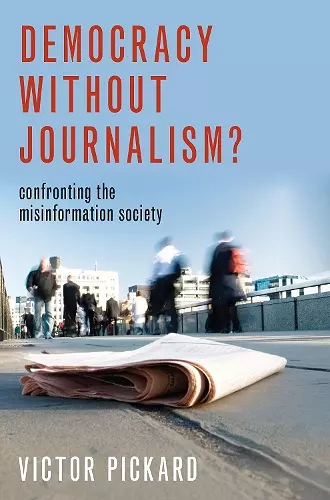Democracy without Journalism?
Confronting the Misinformation Society
Format:Hardback
Publisher:Oxford University Press Inc
Published:6th Dec '19
Currently unavailable, and unfortunately no date known when it will be back
This hardback is available in another edition too:
- Paperback£28.99(9780190946760)

As local media institutions collapse and news deserts sprout up across the country, the US is facing a profound journalism crisis. Meanwhile, continuous revelations about the role that major media outlets--from Facebook to Fox News--play in the spread of misinformation have exposed deep pathologies in American communication systems. Despite these threats to democracy, policy responses have been woefully inadequate. In Democracy Without Journalism? Victor Pickard argues that we're overlooking the core roots of the crisis. By uncovering degradations caused by run-amok commercialism, he brings into focus the historical antecedents, market failures, and policy inaction that led to the implosion of commercial journalism and the proliferation of misinformation through both social media and mainstream news. The problem isn't just the loss of journalism or irresponsibility of Facebook, but the very structure upon which our profit-driven media system is built. The rise of a "misinformation society" is symptomatic of historical and endemic weaknesses in the American media system tracing back to the early commercialization of the press in the 1800s. While professionalization was meant to resolve tensions between journalism's public service and profit imperatives, Pickard argues that it merely camouflaged deeper structural maladies. Journalism has always been in crisis. The market never supported the levels of journalism--especially local, international, policy, and investigative reporting--that a healthy democracy requires. Today these long-term defects have metastasized. In this book, Pickard presents a counter-narrative that shows how the modern journalism crisis stems from media's historical over-reliance on advertising revenue, the ascendance of media monopolies, and a lack of public oversight. He draws attention to the perils of monopoly control over digital infrastructures and the rise of platform monopolies, especially the "Facebook problem." He looks to experiments from the Progressive and New Deal Eras--as well as public media models around the world--to imagine a more reliable and democratic information system. The book envisions what a new kind of journalism might look like, emphasizing the need for a publicly owned and democratically governed media system. Amid growing scrutiny of unaccountable monopoly control over media institutions and concerns about the consequences to democracy, now is an opportune moment to address fundamental flaws in US news and information systems and push for alternatives. Ultimately, the goal is to reinvent journalism.
[T]his whip-smart book is a searing examination of how our broken media system is harming America. It not only lays out the deep problems but presents ways to begin fixing them. * Margaret Sullivan, journalist and author of Newsroom Confidential: Lessons (and Worries) from an Ink-Stained Life *
Democracy without Journalism offers a detailed takedown of the relationship between journalism and commercialism that is both remarkably convincing and refreshingly optimistic. * Jacob L. Nelson, International Journal of Communication *
Written before the pandemic hit, the book is all the more relevant in a world transformed by Covid-19. Among other things, it offers a critical examination of US media history, arguing that at crucial moments, a market-centered understanding of the media has undermined the public good that news outlets provide. Yet the book also offers us an important reminder that it is not too late to right this wrong by creating what Pickard calls 'a permanent public news media shielded from the market. * Anya Schiffrin, The Nation *
Pickard presents a sharp critique and historical review of the 'discursive capture' of policy discussions by market fundamentalism in the US, which bars as beyond discussion even the commitment of the Founders to an active government role in ensuring that the general public will be informed by a lively, vibrant, diverse media system. An eloquent and carefully reasoned call for revival of what has been lost to overcome the severe structural crisis of the media, with its deleterious impact on functioning democracy. A very important book. * Noam Chomsky, MIT and University of Arizona *
Few topics deserve and receive more attention today than the collapse of democratic practices and institutions, as well as the propaganda barrage emanating from social media and the Internet. Conspicuously absent is arguably the single most important factor: the freefall collapse and disintegration of the commercial news media system such that journalism barely exists in the United States compared to a generation ago. Victor Pickard has done a masterful job of explaining the crisis in his highly original Democracy without Journalism? and has provided an evidencebased roadmap to the range of solutions necessary to make democracy functional. It is in all our interests that this brilliant book be widely read. * Robert W. McChesney, University of Illinois at UrbanaChampaign *
This is the best discussion of the crisis of American journalism I have read. Not only does Pickard show how the precarious commercial situation of the press contributes to the fragile state of contemporary democracy, but he charts a path toward more reliable public information and stronger democratic institutions. * W. Lance Bennett, University of Washington, Seattle *
Part journalism history, part policy analysis, and part meditation on the future of the media, Democracy without Journalism? is a stellar book. Pickard expertly describes how markets and public policies have both failed journalism, and offers concrete suggestions for a way forward to support public media in the US. * James T. Hamilton, Stanford University *
- Winner of Finalist, Tankard Award, Association for Education in Journalism and Mass Communication Finalist, Frank Luther Mott/Kappa Tau Alpha Research Award for the Best Book on Journalism and Mass Communication Published in 2020.
ISBN: 9780190946753
Dimensions: 159mm x 241mm x 21mm
Weight: 513g
264 pages